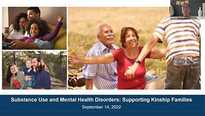Families Affected by Opioids
The opioid crisis continues to affect millions of Americans. These resources offer information about how children and families are affected, and policy and practice examples intended to help communities strengthen their responses.
Highlighted Resource
Substance Use and Mental Health Disorders: Supporting Kinship Families

Date: October 25, 2022
Focuses on the unique challenges that arise when parents of children in care have a substance use or mental health disorder. These
... (Read More)Policy and Practice Resources
SAMHSA Opioid Overdose Prevention Toolkit
Substance Abuse and Mental Health Services A..., 2018
Offers facts, practices, and policy strategies to help health care professionals
... (Read More)Substance Use, the Opioid Epidemic and the Child Welfare System: Key Findings from a Mixed Methods Study
U.S. Department of Health and Human Services..., 2018
Examines how substance use disorder treatment programs and child welfare agencies
... (Read More)Committee Opinion: Opioid Use and Opioid Use Disorder in Pregnancy
The American College of Obstetricians and Gy..., 2017
Joint opinion on the current standard of care for pregnant women with opioid
... (Read More)A Collaborative Approach to the Treatment of Pregnant Women With Opioid Use Disorders: Practice and Policy ...
Substance Abuse and Mental Health Services A..., 2016
Provides information on the extent of opioid use by pregnant women as well as the
... (Read More)Related Online Training, Videos, and Webinars
Substance Use and Mental Health Disorders: Supporting Kinship Families
Date: October 25, 2022
Focuses on the unique challenges that arise when parents of children in care have a substance use or mental health disorder. These
...(Read More)Guidance from the American Academy of Pediatrics on Neonatal Opioid Withdrawal Syndrome
Date: January 26, 2021
Dr. Stephen Patrick, a national expert on maternal opioid use on infants, provides current information on the crisis; implications for
...(Read More)The Management of Care for Pregnant Women with Opioid and Other Substance Use Disorders
Date: June 18, 2020
Dr. Mishka Terplan offers strategies for working with addiction medicine physicians while discussing the role obstetricians can play
...(Read More)Child Welfare Training Toolkit—Special Topic: Opioids
National Center on Substance Abuse and Child..., 2019
Provides adaptable foundational training for child welfare professionals about the
... (Read More)State and Local Examples
Congressional Hearing on the Opioid Crisis: Testimony by Barbara Cimaglio, Deputy Health Commissioner (Verm...
Vermont Department of Health, 2017
Provides information about the state’s hub and spoke systems designed to mitigate the
... (Read More)Ohio Perinatal Quality Collaborative, 2022
Additional Resources
Understanding the Opioid Overdose Epidemic
Center for Disease Control and Prevention, 2022
Provides data on opioid-related overdoses and examines how to slow the epidemic.
... (Read More)State and National Opioid Fact Sheets
American Academy of Pediatrics, 2022
Synthesizes national and state-specific data related to opioids, child welfare, and
... (Read More)National Opioid Crisis
U.S. Department of Health and Human Services, 2022
Provides information on the opioid epidemic, prevention, treatment, and recovery.
... (Read More)America’s Opioid Crisis: The Unseen Impact on Children
American Academy of Pediatrics, 2018
Examines the relationship between the opioid epidemic, child welfare systems, and
... (Read More)